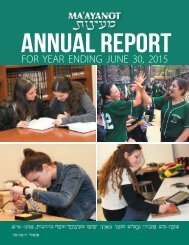Create successful ePaper yourself
Turn your PDF publications into a flip-book with our unique Google optimized e-Paper software.
healthy families<br />
<strong>Winter</strong> Issue<br />
ruchnius way. I can’t imagine<br />
not doing that chart and<br />
using your approach instead.<br />
Would you use charts to<br />
develop good habits?<br />
I'm so happy you brought up this example.<br />
I actually have a big problem with charts<br />
like that. The message you give when<br />
you are rewarding mitzvos is that saying<br />
brachos is something negative. You don’t<br />
need a reward for something that is<br />
intrinsically good.<br />
Listen to this recent study: There were<br />
two groups of children that were each<br />
given a puzzle to do. One group was told,<br />
“You have five minutes to do the puzzle.<br />
When the timer rings you don’t have to<br />
do it anymore, but if you want, you can.”<br />
The second group was told the same,<br />
but was also told that they will get $5<br />
compensation for doing the puzzle when<br />
the timer rings. After five minutes, group<br />
one stayed to work on the puzzle, while<br />
group two took their money and walked<br />
away without finishing the puzzle. Why<br />
is this the case? Because for group two,<br />
once they were offered money, they were<br />
doing it for the reward. They got the<br />
reward and were done. However, for group<br />
one, completing the puzzle itself was the<br />
reward.<br />
Wow, so interesting. So how<br />
does this relate to a brachos<br />
chart?<br />
The chart is like offering $5 to the<br />
group. It takes away from the mitzvah<br />
itself. Instead of giving them a reward,<br />
make saying brachos itself something<br />
enjoyable! Make it fun! Give them hugs,<br />
sing the brachos, create a good feeling<br />
about saying brachos. Parents must be<br />
careful not to create negative associations<br />
with mitzvos. I know people who tell<br />
their children they have to say Tehillim.<br />
Be careful: the associations you create<br />
for your children are very important<br />
and will stay with them throughout life.<br />
When it comes to mitzvos, make positive<br />
associations.<br />
But a lot of our chinuch is<br />
based on teaching about<br />
reward and punishment, which<br />
is why it sort of goes hand<br />
in hand with our education<br />
and parenting. How do<br />
you explain the dichotomy<br />
between the chinuch we<br />
are giving our children and<br />
the parenting method you<br />
describe?<br />
I love this question, and I get it all the<br />
time! S’char and onesh is one of the<br />
ikrei emunah. We say it in Ani Ma’amin<br />
every day. But punishing a child is not<br />
comparable to what onesh is from<br />
Hashem. It’s a different system. Hashem’s<br />
system is perfect because He is perfect<br />
and perfectly loving. Hashem has no ego,<br />
like I do. He has no flaws, like I do. My<br />
punishment and reward<br />
systems are flawed and<br />
imperfect. They are<br />
unfair. And I don’t want<br />
my children to at all<br />
draw a comparison from<br />
my flawed system to<br />
Hashem’s perfect system.<br />
They could not be more<br />
different. So actually,<br />
in order for my child to<br />
know that Hashem works<br />
that way, not only don’t I<br />
need to do it, but it also<br />
paints a false picture<br />
of how Hashem does<br />
it. To me, it is actually<br />
even more important<br />
not to use reward and<br />
punishments as a chinuch<br />
system because it will<br />
taint their view of s’char<br />
and onesh, which is<br />
intrinsically perfect.<br />
I never thought of<br />
it like that. How<br />
true! But what<br />
about a teenager who was<br />
already raised on the reward<br />
and punishment system?<br />
They are used to this “quick<br />
fix” or bargaining method.<br />
How would you recommend<br />
starting to shift?? Is it too<br />
late?<br />
It’s never too late. I work with parents<br />
of teens all the time. I just hung up with<br />
a client with a 17-year-old child and we<br />
were discussing exactly this. Will there be<br />
struggles? Yes. But from all the people<br />
I work with, all of the teenagers love it.<br />
Think about it: Wouldn’t anyone want<br />
their parents to start listening more and<br />
acknowledging? Of course! They might<br />
not be used to it, but they’ll love it. I have<br />
literally seen parents save their teenagers<br />
who were struggling once they started<br />
truly connecting to them...<br />
Okay, but what if it’s not one<br />
or the other? Can’t a parent<br />
be loving and connective, and<br />
still do the reward/punishment<br />
system? At least some of the<br />
time?<br />
You tell me. How safe do you feel in a<br />
relationship with someone who punishes<br />
you? The punishment itself erodes<br />
trust. It’s a barrier to connection. I was<br />
just discussing this with a client. She is<br />
beginning to realize that it’s too hard to<br />
have both. When you are using rewards<br />
and punishments you end up building<br />
an authoritarian approach with your<br />
child. There is no way that it won’t get<br />
in the way of being fully supportive<br />
and connective to your child. Of course,<br />
shifting your approach to parenting<br />
68

















